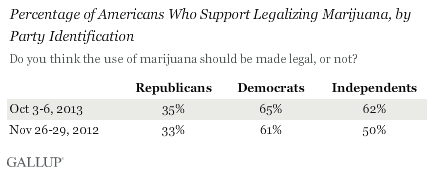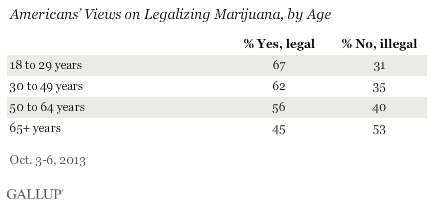October 22, 2013
Support surged 10 percentage points in past year, to 58%
WASHINGTON, D.C. -- For marijuana advocates, the last 12 months have been a period of unprecedented success as Washington and Colorado became the first states to legalize recreational use of marijuana. And now for the first time, a clear majority of Americans (58%) say the drug should be legalized. This is in sharp contrast to the time Gallup first asked the question in 1969, when only 12% favored legalization.

Public support for legalization more than doubled in the 1970s, growing to 28%. It then plateaued during the 1980s and 1990s before inching steadily higher since 2000, reaching 50% in 2011.
A sizable percentage of Americans (38%) this year admitted to having tried the drug, which may be a contributing factor to greater acceptance.
Success at the ballot box in the past year in Colorado and Washington may have increased Americans' tolerance for marijuana legalization. Support for legalization has jumped 10 percentage points since last November and the legal momentum shows no sign of abating. Last week, California's second-highest elected official, Lt. Gov. Gavin Newsom, said that pot should be legal in the Golden State, and advocates of legalization are poised to introduce a statewide referendum in 2014 to legalize the drug.
The Obama administration has also been flexible on the matter. Despite maintaining the government's firm opposition to legalizing marijuana under federal law, in late August Deputy Attorney General James Cole announced the Justice Department would not challenge the legality of Colorado's and Washington's successful referendums, provided that those states maintain strict rules regarding the drug's sale and distribution.
The movement to legalize marijuana mirrors the relatively recent success of the movement to legalize gay marriage, which voters have also approved now in 14 states. Public support for gay marriage, which Americans also overwhelmingly opposed in the past, has increased dramatically, reaching majority support in the last two years.
Independents Fueling Growth in Acceptance of Legalizing Marijuana
Independents' growing support for legalization has mostly driven the jump in Americans' overall support. Sixty-two percent of independents now favor legalization, up 12 points from November 2012. Support for legalization among Democrats and Republicans saw little change. Yet there is a marked divide between Republicans, who still oppose legalizing marijuana, and Democrats and independents.

Young Adults More Likely to Support Legalization
Americans 65 and older are the only age group that still opposes legalizing marijuana. Still, support among this group has jumped 14 percentage points since 2011.
In contrast, 67% of Americans aged 18 to 29 back legalization. Clear majorities of Americans aged 30 to 64 also favor legalization.

Bottom Line
It has been a long path toward majority acceptance of marijuana over the past 44 years, but Americans' support for legalization accelerated as the new millennium began. This acceptance of a substance that most people might have considered forbidden in the late 1960s and 1970s may be attributed to changing social mores and growing social acceptance. The increasing prevalence of medical marijuana as a socially acceptable way to alleviate symptoms of diseases such as arthritis, and as a way to mitigate side effects of chemotherapy, may have also contributed to Americans' growing support.
Whatever the reasons for Americans' greater acceptance of marijuana, it is likely that this momentum will spur further legalization efforts across the United States. Advocates of legalizing marijuana say taxing and regulating the drug could be financially beneficial to states and municipalities nationwide. But detractors such as law enforcement and substance abuse professionals have cited health risks including an increased heart rate, and respiratory and memory problems.
With Americans' support for legalization quadrupling since 1969, and localities on the East Coast such as Portland, Maine, considering a symbolic referendum to legalize marijuana, it is clear that interest in this drug and these issues will remain elevated in the foreseeable future.
Survey Methods
Results for this Gallup poll are based on telephone interviews conducted Oct. 3-6, 2013, on the Gallup Daily tracking survey, with a random sample of 1,028 adults, aged 18 and older, living in all 50 U.S. states and the District of Columbia.
For results based on the total sample of national adults, one can say with 95% confidence that the margin of sampling error is ±4 percentage points.
Interviews are conducted with respondents on landline telephones and cellular phones, with interviews conducted in Spanish for respondents who are primarily Spanish-speaking. Each sample of national adults includes a minimum quota of 50% cellphone respondents and 50% landline respondents, with additional minimum quotas by region. Landline and cell telephone numbers are selected using random-digit-dial methods. Landline respondents are chosen at random within each household on the basis of which member had the most recent birthday.
Samples are weighted to correct for unequal selection probability, nonresponse, and double coverage of landline and cell users in the two sampling frames. They are also weighted to match the national demographics of gender, age, race, Hispanic ethnicity, education, region, population density, and phone status (cellphone only/landline only/both, and cellphone mostly). Demographic weighting targets are based on the March 2012 Current Population Survey figures for the aged 18 and older U.S. population. Phone status targets are based on the July-December 2011 National Health Interview Survey. Population density targets are based on the 2010 census. All reported margins of sampling error include the computed design effects for weighting.
In addition to sampling error, question wording and practical difficulties in conducting surveys can introduce error or bias into the findings of public opinion polls.
For more details on Gallup's polling methodology, visit www.gallup.com.
Sign up for Gallup e-mail alerts or RSS feeds
No comments:
Post a Comment